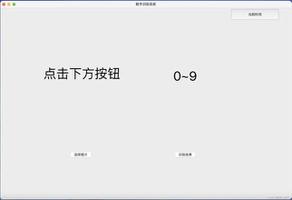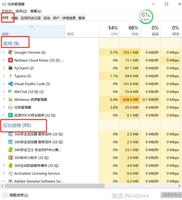Python整数型对象

所有整数都使用以任意大小的长整数对象表示。
在出错时,大多数 PyLong_As* API返回 (返回值类型)-1 ,无法与一般的数字区分开来。请使用 PyErr_Occurred() 来区分。
PyLongObject¶表示 Python 整数对象的
PyObject子类型。
PyTypeObject
PyLong_Type¶这个
PyTypeObject的实例表示 Python 的整数类型。与Python层中的int相同。
int
PyLong_Check(PyObject *p)¶如果参数是
PyLongObject或PyLongObject的子类型,返回 true 。
int
PyLong_CheckExact(PyObject *p)¶如果参数是
PyLongObject但不是PyLongObject的子类型,返回 true。
PyObject*
PyLong_FromLong(long v)¶- Return value: New reference.
由 v 返回一个新的
PyLongObject对象,失败时返回NULL。The current implementation keeps an array of integer objects for all integers
between
-5and256, when you create an int in that range you actuallyjust get back a reference to the existing object. So it should be possible to
change the value of
1. I suspect the behaviour of Python in this case isundefined. :-)
PyObject*
PyLong_FromUnsignedLong(unsigned long v)¶- Return value: New reference.
由 C
unsignedlong类型返回一个新的PyLongObject对象,失败时返回NULL。
PyObject*
PyLong_FromSsize_t(Py_ssize_t v)¶- Return value: New reference.
从 C
Py_ssize_t类型返回一个新的PyLongObject对象,如果失败则返回``NULL``。
PyObject*
PyLong_FromSize_t(size_t v)¶- Return value: New reference.
从 C
size_t返回一个新的PyLongObject对象,如果失败则返回``NULL``。
PyObject*
PyLong_FromLongLong(long long v)¶- Return value: New reference.
从 C
longlong返回一个新的PyLongObject对象,失败时返回``NULL``。
PyObject*
PyLong_FromUnsignedLongLong(unsigned long long v)¶- Return value: New reference.
从 C
unsignedlonglong返回一个新的PyLongObject对象,失败时返回``NULL``。
PyObject*
PyLong_FromDouble(double v)¶- Return value: New reference.
从 v 的整数部分返回一个新的
PyLongObject对象,如果失败则返回``NULL``。
PyObject*
PyLong_FromString(const char *str, char **pend, int base)¶- Return value: New reference.
根据 str 字符串值返回一个新的
PyLongObject,base 指定基数。如果 pend 不是NULL, /*pend 将指向 str 中表示这个数字部分的后面的第一个字符。如果 base 是0, str 将使用 整型数字面值 定义来解释;在这种情况下,一个非零的十进制数中的前导零会引发一个ValueError。如果 base 不是0,它必须在2和` 36` 之间,包括2和36。基数说明符后以及数字之间的前导空格、单下划线将被忽略。如果没有数字,将引发ValueError。
PyObject*
PyLong_FromUnicode(Py_UNICODE *u, Py_ssize_t length, int base)¶- Return value: New reference.
Convert a sequence of Unicode digits to a Python integer value. The Unicode
string is first encoded to a byte string using
PyUnicode_EncodeDecimal()and then converted using
PyLong_FromString().Deprecated since version 3.3, will be removed in version 4.0: 旧的
Py_UNICODEAPI的一部分;请迁移到使用PyLong_FromUnicodeObject()。
PyObject*
PyLong_FromUnicodeObject(PyObject *u, int base)¶- Return value: New reference.
Convert a sequence of Unicode digits in the string u to a Python integer
value. The Unicode string is first encoded to a byte string using
PyUnicode_EncodeDecimal()and then converted usingPyLong_FromString().3.3 新版功能.
PyObject*
PyLong_FromVoidPtr(void *p)¶- Return value: New reference.
从指针 p 创建一个 Python 整数。可以使用
PyLong_AsVoidPtr()返回的指针值。
long
PyLong_AsLong(PyObject *obj)¶Return a C
longrepresentation of obj. If obj is not aninstance of
PyLongObject, first call its__int__()method(if present) to convert it to a
PyLongObject.如果 obj 的值溢出了
long的范围,会抛出OverflowError。发生错误时返回
-1。使用PyErr_Occurred()来消歧义。
long
PyLong_AsLongAndOverflow(PyObject *obj, int *overflow)¶Return a C
longrepresentation of obj. If obj is not aninstance of
PyLongObject, first call its__int__()method(if present) to convert it to a
PyLongObject.If the value of obj is greater than
LONG_MAXor less thanLONG_MIN, set *overflow to1or-1, respectively, andreturn
-1; otherwise, set *overflow to0. If any other exceptionoccurs set *overflow to
0and return-1as usual.发生错误时返回
-1。使用PyErr_Occurred()来消歧义。
long long
PyLong_AsLongLong(PyObject *obj)¶Return a C
longlongrepresentation of obj. If obj is not aninstance of
PyLongObject, first call its__int__()method(if present) to convert it to a
PyLongObject.如果 obj 值超出
longlong,触发OverflowError发生错误时返回
-1。使用PyErr_Occurred()来消歧义。
long long
PyLong_AsLongLongAndOverflow(PyObject *obj, int *overflow)¶Return a C
longlongrepresentation of obj. If obj is not aninstance of
PyLongObject, first call its__int__()method(if present) to convert it to a
PyLongObject.If the value of obj is greater than
PY_LLONG_MAXor less thanPY_LLONG_MIN, set *overflow to1or-1, respectively,and return
-1; otherwise, set *overflow to0. If any otherexception occurs set *overflow to
0and return-1as usual.发生错误时返回
-1。使用PyErr_Occurred()来消歧义。3.2 新版功能.
Py_ssize_t
PyLong_AsSsize_t(PyObject *pylong)¶Return a C
Py_ssize_trepresentation of pylong. pylong mustbe an instance of
PyLongObject.Raise
OverflowErrorif the value of pylong is out of range for aPy_ssize_t.发生错误时返回
-1。使用PyErr_Occurred()来消歧义。
unsigned long
PyLong_AsUnsignedLong(PyObject *pylong)¶Return a C
unsignedlongrepresentation of pylong. pylongmust be an instance of
PyLongObject.Raise
OverflowErrorif the value of pylong is out of range for aunsignedlong.Returns
(unsignedlong)-1on error.Use
PyErr_Occurred()to disambiguate.
size_t
PyLong_AsSize_t(PyObject *pylong)¶Return a C
size_trepresentation of pylong. pylong must bean instance of
PyLongObject.Raise
OverflowErrorif the value of pylong is out of range for asize_t.Returns
(size_t)-1on error.Use
PyErr_Occurred()to disambiguate.
unsigned long long
PyLong_AsUnsignedLongLong(PyObject *pylong)¶Return a C
unsignedlonglongrepresentation of pylong. pylongmust be an instance of
PyLongObject.Raise
OverflowErrorif the value of pylong is out of range for anunsignedlonglong.Returns
(unsignedlonglong)-1on error.Use
PyErr_Occurred()to disambiguate.在 3.1 版更改: A negative pylong now raises
OverflowError, notTypeError.
unsigned long
PyLong_AsUnsignedLongMask(PyObject *obj)¶Return a C
unsignedlongrepresentation of obj. If objis not an instance of
PyLongObject, first call its__int__()method (if present) to convert it to a
PyLongObject.If the value of obj is out of range for an
unsignedlong,return the reduction of that value modulo
ULONG_MAX+1.Returns
(unsignedlong)-1on error. UsePyErr_Occurred()todisambiguate.
unsigned long long
PyLong_AsUnsignedLongLongMask(PyObject *obj)¶Return a C
unsignedlonglongrepresentation of obj. If objis not an instance of
PyLongObject, first call its__int__()method (if present) to convert it to a
PyLongObject.If the value of obj is out of range for an
unsignedlonglong,return the reduction of that value modulo
PY_ULLONG_MAX+1.Returns
(unsignedlonglong)-1on error. UsePyErr_Occurred()to disambiguate.
double
PyLong_AsDouble(PyObject *pylong)¶Return a C
doublerepresentation of pylong. pylong must bean instance of
PyLongObject.Raise
OverflowErrorif the value of pylong is out of range for adouble.Returns
-1.0on error. UsePyErr_Occurred()to disambiguate.
void*
PyLong_AsVoidPtr(PyObject *pylong)¶Convert a Python integer pylong to a C
voidpointer.If pylong cannot be converted, an
OverflowErrorwill be raised. Thisis only assured to produce a usable
voidpointer for values createdwith
PyLong_FromVoidPtr().Returns
NULLon error. UsePyErr_Occurred()to disambiguate.






